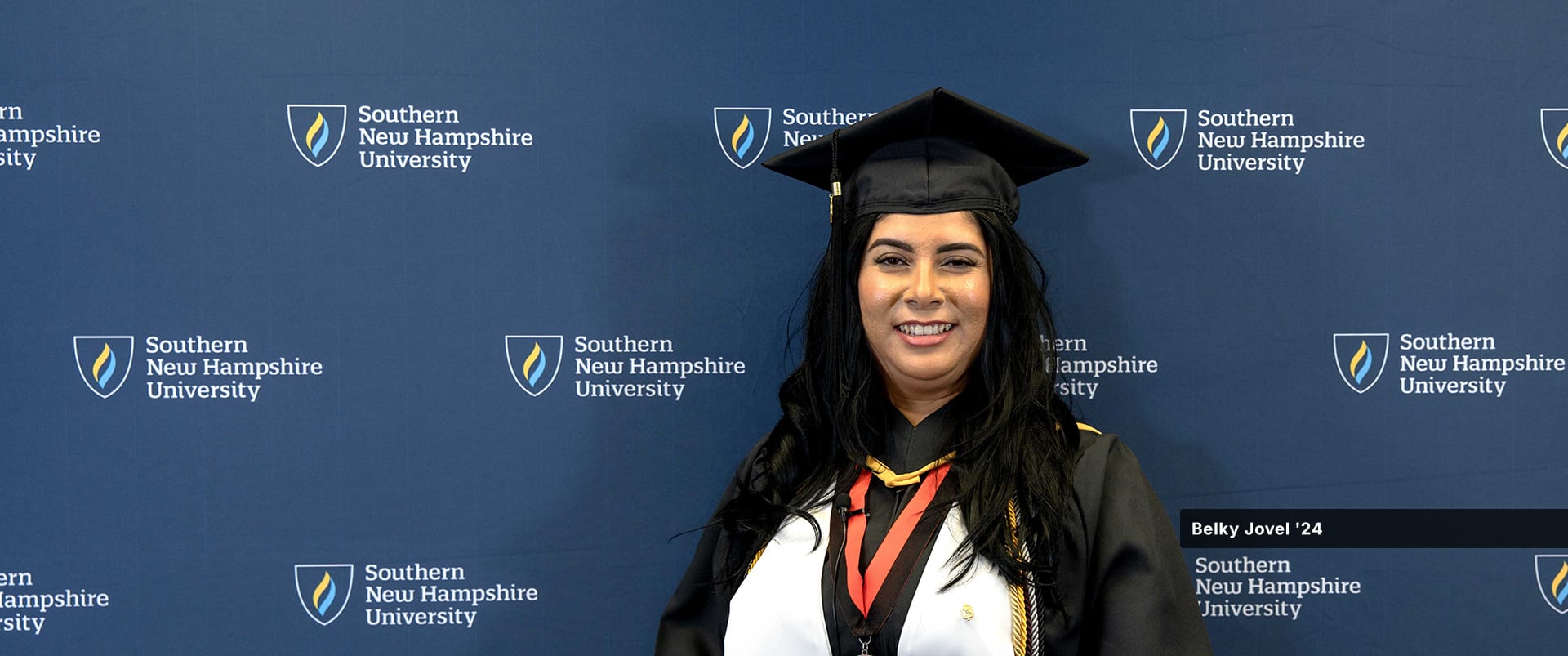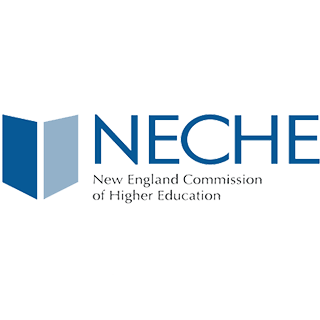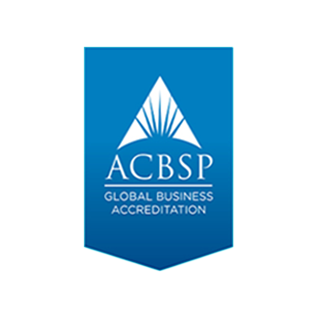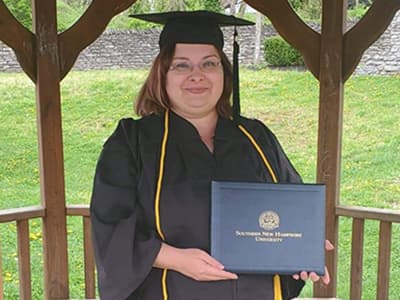For Jazzmen Shipp, Earning a Degree Changed Everything
Business | 2min Read

Develop the accounting and business skills that employers desire with an online Associate of Science (AS) in Accounting from Southern New Hampshire University. The associate degree in accounting is perfect for professionals who want to enter an accounting-related field or lay the groundwork for continuing their education in accounting or business.
The credits you earn from your associate accounting degree at SNHU seamlessly stack into our online BS in Accounting. This means you can earn 2 degrees in the same time it takes to get just one. Plus, if you'd like to become a Certified Public Accountant (CPA), our associate’s degree in accounting can support your journey towards educational eligibility.

This 60-credit online accounting degree curriculum can give you a foundation in essential accounting principles and practices. You’ll understand how to handle a company’s finances, the basics of economics, statistics and how marketing plays a role in the world of accounting.
When you graduate with your associate degree in accounting, you can count on having both widely applicable skills and highly specified accounting knowledge. This means you can go on to pursue entry-level jobs or more advanced degrees in any number of fields.
Throughout your studies, you'll gain a foundational understanding of accounting. You'll get practice with accounting tools including Microsoft Suite, Excel, PowerPoint and Word. You'll also have the opportunity to earn certifications in Wiley Excel for Accountants, and identify how Excel can be used for mission-critical tasks such as calculating profits, losses and margins; doing what-if analysis; and analyzing large data sets.
Interested in accounting, but afraid of taking math courses? Don't be. According to our instructors, communication skills are more important than being a math whiz when it comes to accounting. No matter the course, our instructors can help equip you with the relevant specialized accounting skills you need to start a career in accounting.
Visit the course catalog to view the full AS in Accounting curriculum.
All undergraduate students are required to take general education courses, which are part of SNHU's newly redesigned program, The Commons. The goal of The Commons' curriculum is to empower you with some of the most in-demand skills, so you can succeed not only in your academic career, but in your personal and professional life too.
Minimum Specifications:
Additional Information:
The content in SNHU's AS Accounting program was intentionally aligned to the 2024 Uniform Certified Public Accounting (CPA) Examination®. Learners interested in the exam and licensure may also pursue SNHU’s BS and MS Accounting degrees to help them achieve educational eligibility, which stands at 150 credits in most jurisdictions. Completion of the AS Accounting degree alone will not satisfy complete educational eligibility to sit for the CPA licensure exam or to become licensed certified public accountants in most jurisdictions.
Licensing requirements to sit for the CPA exam vary from jurisdiction to jurisdiction. Students are encouraged to review their jurisdiction-specific requirements. Jurisdiction educational requirements can be found on the website of the National Association of State Boards of Accountancy (NASBA), while jurisdiction CPA licensing requirements can be found through the Accounting Licensing Library, powered by the NASBA.
For more information on which SNHU programs satisfy educational eligibility by state, please visit our licensure and certification disclosure page.
Our no-commitment application can help you decide if SNHU is the right college for you and your career goals. Apply up until 2 days before the term starts!
Upcoming term starts: May 4, 2026 | June 29, 2026
Attending college online at SNHU can be a life-changing experience. In fact, 93.4% of online students would recommend SNHU according to a 2025 survey with 8,718 respondents.
SNHU accounting courses are taught by instructors with professional credentials and years of experience in accounting, taxation and fraud examination.

Matthew Sliker is an accounting manager at a large accounting firm where he works in advising, auditing, tax and accounting. His knowledge of federal budgetary accounting and regulatory standards have allowed him to work in both the professional and academic spheres.
Position
Adjunct Faculty, Business
Joined SNHU
2023
Education
"By joining SNHU, you become part of a vibrant and inclusive community, building a valuable network of peers, faculty and alumni."

Before finding a love for online teaching, Mona Stephens spent much of her auditing and accountancy career in local government. She is a Certified Public Accountant and Certified Internal Auditor who loves working with students and sharing her passion for all things accounting. Stephens is also a member of numerous industry organizations, including the Government Finance Officers Association, the American Association of Accountants and the Institute of Management Accountants.
Position
Accounting Lead Faculty
Joined SNHU
2011
Education

Kristin Regis began her teaching career as an English instructor at Edogawa University near Tokyo, Japan. Her passion for teaching and finance prompted her to start teaching finance courses part time at SNHU (both face-to-face and online) before transitioning into a full-time finance faculty lead role. Prior to working full time for SNHU, she held corporate and municipal leadership positions for over 10 years. Regis is a member of the Financial Planning Association
Position
Senior Associate Dean
Education
You’ll take your courses within SNHU’s Brightspace platform. This is where you’ll find your:

At Southern New Hampshire University, you'll have access to a powerful network of more than 400,000 students, alumni and staff that can help support you long after graduation. Our instructors offer relevant, real-world expertise to help you understand and navigate the field. Plus, with our growing, nationwide alumni network, you'll have the potential to tap into a number of internship and career opportunities.
Recently, SNHU has been nationally recognized for leading the way toward more innovative, affordable and achievable education:
Founded in 1932, Southern New Hampshire University is a private, nonprofit institution with over 250,000 graduates across the country. SNHU is accredited by the regional accreditor New England Commission of Higher Education (NECHE), which advocates for institutional improvement and public assurance of quality.
No application fee. No test scores. And no college essay. Just a simple form with basic information. It’s another way SNHU helps you reach your goals sooner.
It's easy, fast and free.
Whether you're applying for an undergraduate or graduate degree, you’ll fill out a form to verify your previous education experience. As part of our admissions process, we'll help you request transcripts from your previous school(s) to see if you can transfer any credits into your SNHU program! (Also for free!)
After reviewing your official evaluation, you can decide if SNHU is right for you! If you choose to enroll, just pick your start date and get ready for classes to begin.
Talk to an admission counselor: 888.327.SNHU | enroll@snhu.edu
SNHU is accredited by the regional accreditor the New England Commission of Higher Education (NECHE). The university also carries specialized accreditations for some programs.
This program and its concentrations are accredited by the Accreditation Council for Business Schools and Programs (ACBSP). Student achievement data can be found on the ACBSP accreditation page.


As a nonprofit university, SNHU offers some of the lowest online tuition rates in the country. And when you work with our Financial Services team, we'll explore ways to help you save even more on your education – and customize a payment plan that works for you.
*before previously earned credits are applied
Tuition rates are subject to change and are reviewed annually.
**Note: Students receiving this rate are not eligible for additional discounts.
Additional costs: Course materials vary by course.
If 12 of your prior learning credits ($342/credit) are accepted toward your associate degree.
Your remaining tuition cost: $16,416
If 24 of your prior learning credits ($342/credit) are accepted toward your associate degree.
Your remaining tuition cost: $12,312
If 36 of your prior learning credits ($342/credit) are accepted toward your associate degree.
Your remaining tuition cost: $8,208
If 45 of your prior learning credits ($342/credit) are accepted toward your associate degree.
Your remaining tuition cost: $5,130
How we estimate your tuition cost:
We look at the cost per credit multiplied by the number of credits you need to earn for an associate degree. Most associate degrees require 60 credits. SNHU allows you to transfer in up to 45 credits, requiring a minimum of 15 credits to be taken at SNHU. This is only a tuition estimator and doesn't account for other fees that may be associated with your program of choice.
Transfer up to 45 credits toward your associate degree program at SNHU. If you’ve taken one course or many, we’ll evaluate them for you.
Fill out the FAFSA to see if you’re eligible for grants or work-study. (You could also be offered loans, though you’ll have to pay those back later.)
Earn credits in leadership, technology and more – while taking advantage of tuition discounts for active-duty service members and spouses.
Getting free money for college – from SNHU or an outside organization – could help you save hundreds or even thousands of dollars.
Bring in credits from popular options like CLEP, Sophia Learning, Google and other common credit for prior learning (CPL) experiences.
Learn how you can save money with tuition reimbursement from your employer.
Take advantage of an online tuition discount through your organization’s partnership with SNHU. Check with your employer to see if your organization partners with us and if you’re eligible for additional tuition savings and partner education benefits.
The online associate degree in accounting provides a solid foundation in accounting principles and practices to prepare you for entry-level positions in nearly every industry. And when it comes to office and administrative support, earning your associate in accounting could position you well for many roles.
Getting an associate degree can also improve your earning potential. In 2023, the BLS reported associate degree holders' median weekly earnings were almost 18% higher than those of workers who didn't continue their education beyond high school.1 Additionally, the BLS cited people with associate degrees experienced a lower unemployment rate (2.7%) in 2023 than workers with only high school diplomas (3.9%).1
If you want to move on to higher-paying roles in accounting, you'll want to continue your education after finishing your associate degree. Our bachelor's in accounting is a great next step, but we also provide dozens of other business degrees – and beyond – that are worth exploring.
Once you earn your associate degree, you'll be prepared to jump into entry-level roles in your industry. You'll learn how to apply financial, managerial and cost accounting principles to your daily work and become an asset to any company.
Some entry-level jobs include:
Support accounting operations by assisting with financial transactions, reconciling accounts and preparing financial reports under the supervision of accountants or financial managers.
Manage incoming payments, maintain accurate records of transactions and communicate with clients to ensure timely collection of outstanding debts.
Generate invoices, process payments and resolve billing discrepancies to ensure accurate and timely billing for goods or services provided by a company.
Calculate and process employee wages, deductions and taxes, maintain payroll records, and ensure compliance with relevant regulations and company policies regarding payroll administration.
The median national annual salary for financial clerks in 2023, according to the U.S. Bureau of Labor Statistics (BLS).1
Understanding the numbers
When reviewing job growth and salary information, it’s important to remember that actual numbers can vary due to many different factors—like years of experience in the role, industry of employment, geographic location, worker skill and economic conditions. Cited projections are based on Bureau of Labor Statistics data, not on SNHU graduate outcomes, and do not guarantee actual salary or job growth.

Tabitha Paige Tillery '20
Yes, you can. An associate degree in accounting is a great way to jumpstart an accounting career and can help you gain professional experience faster.
While many accounting jobs require a bachelor’s degree, an accounting associate degree will give you the skills you need to succeed in entry-level roles. The credits you earn from an AS in Accounting degree from SNHU can also easily stack into a BS in Accounting – meaning you could earn 2 degrees in the same amount of time it takes to get 1.
With an online associate degree in accounting, you’ll gain a strong foundation of key career skills through general education courses, including communication, critical thinking, problem-solving and decision-making.
You’ll also explore accounting, finance and business topics, and learn how to apply this knowledge to daily accounting work. Your accounting associate degree will explore:
It depends on your career path. While earning an associate degree in accounting can help you earn more than workers without a college degree, specific salaries will vary.
According to the U.S. Bureau of Labor Statistics, in 2023 the median annual salary for bookkeeping, accounting and auditing clerks, for example, was $47,440 — with the highest 10% earning more than $68,860.1 That same year, financial clerks earned a median salary of $47,070, while bill and account collectors earned a median salary of $44,250.1
Continuing your accounting education with a bachelor’s degree, online master’s in accounting, accounting certification or a graduate certificate in accounting can open up more job opportunities and lead to higher pay.
The best online college for accounting is the one that prepares you for the career you want and offers the flexibility to help you achieve your goals, whether you’re working full time or balancing coursework with family obligations.
That's why Akeda Toby-Locke '19 chose Southern New Hampshire University.
"I really enjoyed the flexibility to study and complete my assignments by the specific deadlines on my time."
At SNHU, the online associate in accounting is designed to give you the skills you need to get started in entry-level accounting jobs faster. And our innovative online programs ensure you have the support you need to complete your degree.
Online students have access to a wide range of virtual student services, including writing help, tutoring and academic and career advising.
During her associate degree program, Makya Vandiver-Hawkins '21 relied on these resources and the continuous support of her SNHU community to help her earn her degree.
"There were times that I needed to have someone by my side walking me through something," said Vandiver-Hawkins. "Thankfully there is 24/7 tutoring that I took advantage of during these times."
Online clubs and student organizations are also offered to help you grow your personal network and get hands-on learning experience.
SNHU’s generous transfer policy allows up to 45 credits from a previous institution to be applied to one of our associate degree programs. If you’ve completed some college coursework already, this means you can save money and time, and start your career even faster.
If you want to start your accounting career right away, then yes. With an associate in accounting, you can gain the skills you need to kick off an accounting career and start gaining valuable professional experience faster. In today's job market, more students are seeking this faster-paced option.
Earning an online associate degree in accounting can also help boost your long-term earning and career potential.
According to the U.S. Bureau of Labor Statistics (BLS), associate degree holders earned nearly 18% more each week in 2023 than workers with only a high school diploma.1 Plus, workers with associate degrees saw an unemployment rate of just 2.7% in 2023, while workers with only high school diplomas saw an unemployment rate of 3.9%.1
But there's more to an associate degree in accounting than just earning potential. It's an opportunity to put your goals within reach.
"[This program] helped me get a degree that I can use and helped prove to myself that I could accomplish anything," said Tabitha Paige Tillery '20.
If you want to advance your career even further, earning an associate degree can give you a head start toward earning a bachelor’s in accounting degree. An SNHU bachelor’s degree in accounting can provide the educational requirements needed to pursue valuable professional certifications, like certified management accountant (CMA) and certified public accountant (CPA).
It varies based on your specific role and the industry in which you work. For example, the U.S. Bureau of Labor Statistics (BLS) notes that the median annual salary for bookkeeping, accounting and auditing clerks was $47,440 in 2023 — or $22.81 per hour.1
But pay varied for bookkeeping, accounting and auditing clerks depending on the industry in which they worked. According to the BLS, those in finance and insurance earned a median salary of $48,540 in 2023, while those in the retail trade earned a median wage of $43,150 that same year.1
Yes, they are. As technology evolves and more of our daily lives move online, students and employers alike are recognizing the value of an online degree.
Online learning continues to grow in higher education. According to the National Center for Education Statistics, some 75%, or 11.8 million, undergraduate students were enrolled in at least one distance education course in the Fall of 2020 as a result of the COVID-19 pandemic, while another 44% – 7 million – took exclusively distance education courses. While this number has come down since the peak of the pandemic, some aspects of distance education are expected to stay in schools across the U.S. for the foreseeable future. In many ways, online learning was normalized in a permanent way as a result of the pandemic.2
At SNHU, we've been offering online coursework for over 25 years. Our online accounting courses are taught by faculty with years of experience in the field, ensuring you have access to the most up-to-date information and accounting practices. And while your coursework may be online, you’ll gain key career skills through hands-on learning opportunities, so you can apply your learning to the day-to-day work of accounting right away.
1Bureau of Labor Statistics, U.S. Department of Labor, Occupational Outlook Handbook, on the internet, at:
Cited projections may not reflect local and/or short-term economic or job conditions and do not guarantee actual job growth.
2National Center for Education Statistics, Distance Learning Fast Facts, on the internet, at https://nces.ed.gov/fastfacts/display.asp?id=80 (viewed April 19, 2024)